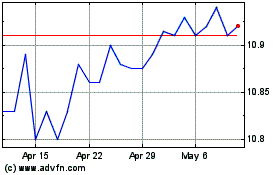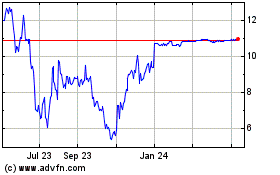By Benjamin Mullin and Cara Lombardo
CBS Corp. and Viacom Inc. agreed to merge, a deal the media
companies hope will put them on stronger footing to compete with
larger rivals in a business buffeted by cable TV cord-cutting and
increasingly dominated by streaming.
The all-stock deal, if completed, will reunite the media empire
of mogul Sumner Redstone, who had split up CBS and Viacom in 2006.
It will create a major entertainment player valued at roughly $30
billion, combining Viacom properties such as MTV, Nickelodeon,
Comedy Central and the Paramount film and TV studio with CBS's
broadcast network and Showtime premium network.
The companies are betting now that merging back together will
help them battle titans like Walt Disney Co., Comcast Corp.,
AT&T Inc. and Netflix Inc. and remain relevant as consumers
sign up for streaming video services and pay TV distributors look
to cut the fees they pay to programmers.
Shari Redstone, Mr. Redstone's daughter and vice chair of both
companies, will become chair of the combined company. The deal
would cement Ms. Redstone's status as a powerful media mogul.
She controls both CBS and Viacom along with her father, through
their family holding company National Amusements Inc.
Bob Bakish, currently the chief executive of Viacom, would
become CEO of the combined entity, while CBS Acting Chief Executive
Joe Ianniello would get the title of chairman and CEO of CBS,
running its assets.
The deal values Viacom at around $11.8 billion, roughly on par
with its current market valuation. Viacom shareholders will receive
0.59625 CBS share for each share they own. Viacom has been the
weaker of the two media companies over the past several years, and
its stock had risen this year, in part on speculation of a CBS
deal.
Under the terms of the agreement, CBS will receive six seats on
the 13-member board and Viacom will get four. National Amusements
will get two board seats. Mr. Bakish will also get a board
seat.
ViacomCBS would have a diverse stable of programming. Viacom
brings to the table about 20 cable networks, including a handful of
large ones, while CBS has its flagship broadcast network and
premium channel Showtime.
That collection of networks could give the merged company
greater leverage in negotiations with pay-TV providers, many of
which have taken a harder line with TV programmers as cord-cutters
flee the traditional cable bundle. CBS has the rights to air
National Football League games through 2022, giving the combined
entity a valuable bargaining chip since live sports continue to be
one of the major draws of cable TV.
Viacom's biggest rivals have struck major deals over the past
several years. NBCUniversal sold to cable giant Comcast and, more
recently, Time Warner Inc. sold to AT&T, while Disney acquired
the bulk of 21st Century Fox.
ViacomCBS would still be a relative minnow, with a much smaller
market capitalization than big industry players. It would need to
do additional deals to bulk up to the size of its rivals.
The bigger media companies have some major advantages. Disney,
for example, has a fabled trove of intellectual property and a
variety of assets -- from theme parks to cable networks to movie
franchises. Netflix has a seemingly insurmountable lead in
streaming-video subscriptions, with 150 million paying users
globally.
Disney, Comcast and AT&T are all trying to take on Netflix
with plans to launch their own subscription streaming-video
services. CBS has its own service, CBS All Access. But CBS and
Viacom also both are big suppliers to Netflix and other digital
players.
Between their various production outfits and channels, ViacomCBS
would have a combined library of 140,000 episodes of premium TV and
3,600 film titles, the companies said. Some 750 series are ordered
or in production. ViacomCBS would be among the top spenders on
programming, with more than $13 billion spent over the past 12
months.
Beneath Mr. Bakish will be an executive team responsible for
overseeing the company's combined cable-networks group, broadcast
network, television production studios, its direct-to-consumer
streaming services, film studio and advertising sales
divisions.
Christina Spade, the chief financial officer of CBS, will become
CFO of ViacomCBS. Christa D'Alimonte, the general counsel of
Viacom, will be general counsel.
David Nevins, the chief creative officer of CBS, will continue
in his current role. Jim Lanzone, the president and chief executive
of CBS Interactive, will retain that title.
ViacomCBS would seek $500 million in annual synergies, according
to the companies.
The companies may have to navigate some cultural challenges. CBS
is the stronger player, but Viacom's leader will be the CEO.
Directors at CBS and Viacom explored a merger three times in the
past four years.
The first merger attempt, in late 2016, was called off due to a
lack of enthusiasm on the part of both companies. The second
attempt, in 2018, led to a prolonged legal battle between National
Amusements and CBS over the future of the company. CBS, under
then-CEO Leslie Moonves, sought to strip Ms. Redstone of her voting
control of the company by issuing a dividend that would dilute
National Amusements' voting stake.
National Amusements resisted the change and the dispute went to
court. Under a settlement reached last September, Ms. Redstone
emerged with her control intact, and the board of CBS underwent a
significant overhaul; new directors who were friendlier to her
joined the board. Mr. Moonves was forced out after multiple women
accused him of sexual assault and harassment. Mr. Moonves has
denied accusations of nonconsensual sexual relations.
Ms. Redstone is unique among media moguls in the way she
exercises influence over CBS and Viacom. Her power is concentrated
in a holding company that is technically controlled by her ailing
father. The 96-year-old Mr. Redstone owns 80% of the voting shares
of National Amusements, which itself holds controlling stakes in
CBS and Viacom.
In a statement, Ms. Redstone said, "I am really excited to see
these two great companies come together so that they can realize
the incredible power of their combined assets. My father once said
'content is king,' and never has that been more true than
today."
Ms. Redstone has had a complicated relationship with her father
over the years -- at times, she seemed to be the favored heir,
while at other times they feuded. But a few years ago, as his
health deteriorated, she rose to prominence in the empire and took
effective control.
The holding company's bylaws were amended in 2016 to make clear
that Mr. Redstone had a single vote among seven NAI directors in
decisions tied to Viacom and CBS stakes.
The deal reverses the move, made in 2006, to split up CBS and
Viacom. That cleaved Viacom's then-booming cable-networks division
from CBS's more mature TV business. Mr. Redstone, concerned that
the stock of the combined company had stagnated, blessed a move
that created two public companies that one analyst dubbed "ViaGrow"
(referring to Viacom) and "ViaSlow" (a tongue-in-cheek reference to
CBS).
But the narrative flipped over the years as CBS's prospects grew
brighter while Viacom's dimmed. CBS, fueled by hit shows and
subscription-TV revenues, was more resilient as consumers began
cutting the cable TV cord in larger numbers. By contrast, Viacom
suffered major ratings declines at its big networks, leading to
battles with its distributors.
Viacom's weakness relative to CBS was one of the major sticking
points for CBS directors in recent years when the two companies
explored a merger. CBS executives were fearful of being saddled
with fading cable channels that would hamper their ability to
negotiate with pay-TV distributors.
Write to Benjamin Mullin at Benjamin.Mullin@wsj.com and Cara
Lombardo at cara.lombardo@wsj.com
(END) Dow Jones Newswires
August 13, 2019 15:55 ET (19:55 GMT)
Copyright (c) 2019 Dow Jones & Company, Inc.
Via Renewables (NASDAQ:VIA)
Historical Stock Chart
From Mar 2024 to Apr 2024

Via Renewables (NASDAQ:VIA)
Historical Stock Chart
From Apr 2023 to Apr 2024
